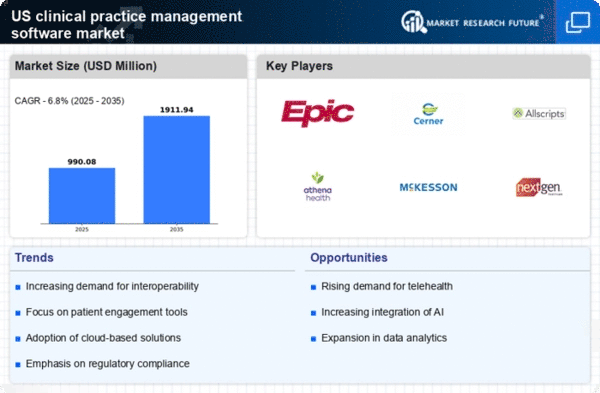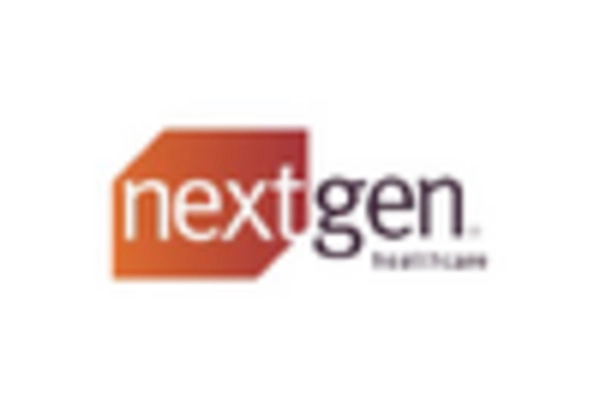Growing Demand for Efficiency
The clinical practice-management-software market is experiencing a notable surge in demand for efficiency among healthcare providers. As practices strive to optimize operations, software solutions that streamline administrative tasks, such as scheduling and billing, are increasingly sought after. This trend is underscored by a reported 30% increase in the adoption of practice-management software in the last year alone. Providers recognize that enhanced efficiency not only reduces operational costs but also improves patient satisfaction. Consequently, the clinical practice-management-software market is positioned to benefit from this growing emphasis on operational excellence, as practices seek tools that facilitate better resource management and workflow optimization.
Regulatory Compliance Pressures
Regulatory compliance remains a critical driver in the clinical practice-management-software market. With the healthcare landscape continually evolving, practices must adhere to a myriad of regulations, including HIPAA and MACRA. Non-compliance can result in substantial penalties, prompting practices to invest in software solutions that ensure adherence to these regulations. The market has seen a 20% increase in demand for compliance-focused software features, as practices prioritize risk management and legal adherence. This trend indicates that the clinical practice-management-software market will continue to grow as providers seek tools that facilitate compliance and mitigate potential legal risks.
Integration of Advanced Analytics
The integration of advanced analytics into the clinical practice-management-software market is transforming how healthcare providers make decisions. By leveraging data analytics, practices can gain insights into patient outcomes, operational performance, and financial health. This capability is particularly relevant as healthcare organizations increasingly focus on value-based care models. Reports indicate that practices utilizing analytics-driven software have seen a 25% improvement in patient care metrics. As a result, the demand for clinical practice-management software that incorporates robust analytics features is likely to rise, enabling providers to make informed decisions that enhance both operational efficiency and patient care.
Shift Towards Patient-Centric Care
The clinical practice-management-software market is increasingly influenced by the shift towards patient-centric care. Healthcare providers are recognizing the importance of engaging patients in their own care processes, which necessitates software that supports communication and collaboration. Features such as patient portals and telehealth capabilities are becoming essential components of practice-management solutions. This shift is reflected in a 15% increase in the adoption of patient engagement tools within practice-management software. As practices strive to enhance patient experiences and outcomes, the clinical practice-management-software market is likely to expand to accommodate these evolving needs.
Technological Advancements in Healthcare
Technological advancements are significantly shaping the clinical practice-management-software market. Innovations such as artificial intelligence (AI) and machine learning are being integrated into software solutions, enhancing functionalities like predictive analytics and automated workflows. These advancements are not only improving operational efficiency but also enabling better patient care through data-driven insights. The market has observed a 10% growth in the adoption of AI-enabled practice-management software, as providers seek to leverage technology for improved decision-making. This trend suggests that the clinical practice-management-software market will continue to evolve, driven by the need for cutting-edge technology in healthcare.
















